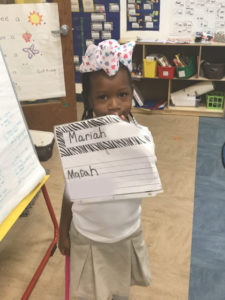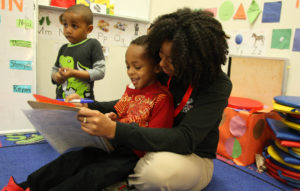When Literacy Lab staff are interviewing applicants for tutoring positions, there are a few common questions that come up. What does training look like? Do students get excited about tutoring sessions? Are there opportunities for leadership development after a year in the program?
If an applicant is interested in serving as a Pre-K tutor, it’s pretty likely that they’ll ask us what exactly they’ll be doing in the classroom. Every applicant knows that getting students started with reading skills early in their educational journey is important. But when it comes to students as young as 3- and 4-years old, what does it look like to build those important skills?

Skills like alphabet knowledge, book and print knowledge, phonological awareness, vocabulary, and oral language are considered emergent literacy or pre-literacy skills. Pre-K literacy tutors use developmentally appropriate techniques to help students develop these building blocks of reading. Cognitive research has demonstrated how focusing on these skills can prepare students to be lifelong readers.
In a recent interview with NPR Ed, cognitive scientist Mark Seidenberg noted that successful reading instruction for has to do with linking speech to printed text. Pre-K literacy tutors help students build meaningful connections between written words and spoken language through one-on-one and small group activities.
Every morning, tutors start the day with Sign-In, an activity where they prompt each individual student to write their name. With the help of their lead teachers and master coaches, Pre-K tutors develop specific ways of supporting their students through this activity. DC tutor Shakia made resuable name placemats for her students. Because they’re reusable, Shakia’s students can keep practicing after her one-on-one time with them.
Two other important emergent literacy skills are vocabulary and oral language. Since the 1990’s, educators and parents have cited the work of researchers Betty Hart and Todd Risley in conversations about the importance of speaking out loud to young children. Their study, commonly known as the 30 Million Word Gap, found that on average children from lower socioeconomic homes hear significantly fewer words-per-hour than their peers, which can affect kindergarten readiness and eventually success in reading.
Later research found that it wasn’t just the quantity of words that children heard, but the quality of verbal interactions, that could help them on the road to becoming strong readers. Literacy tutors serving in early learning centers build meaningful conversations with at least five exchanges, called “Strive For Five” conversations, into their daily routines.

Pre-K tutors also spend time every day reading with their students. Together, they find and define vocabulary words in books, answer questions about the story, and turn and talk with their neighbors in “Think, Pair, Share.”
“They’re always willing and excited to learn new things!” says Pre-K tutor Gina about the students she reads out loud with every day. “They know that even if they don’t understand something yet, with some hard work and consistency, they will.”
To learn more about our Pre-K program, visit the “Our Approach” page of our website! The application to serve as a Literacy Lab tutor in the 2018-19 school year is now open.